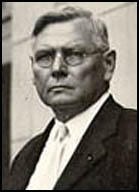Ross Sterling

Ross Shaw Sterling was born in Anahuac, Texas, in February, 1875. He received little formal education and worked as a farmer until opening a feed store at Sour Lake in 1903. This was a great success and he later purchased a number of small banks. He also invested in the oil industry and in 1910 he started a new venture which developed into the Humble Oil and Refining Company.
In 1925 he sold Humble Oil and used the money to invest in real estate in the Houston area. Sterling also purchased The H ouston Dispatch (1925) and The Houston Post (1926).
A member of the Democratic Party Sterling was elected governor of Texas and he took office on 20th January, 1931. At this time the major oil producers in Texas were concerning about the fall in price of oil. The Texas Railroad Commission, under the control of these companies, attempted to limit the production of oil (prorationing) in the new fields of East Texas. On 31st July, 1931, the federal court in Houston sided with a group of independent oil producers and ruled that the Texas Railroad Commission had no right to impose prorationing.
Large oil companies in Texas such as Humble Oil were in favour of prorationing and Sterling came under great pressure to intervene. On 16th August, 1931, Sterling declared martial law in Rusk, Upshur, Gregg and Smith counties. In his proclamation Sterling declared that the independent oil producers in these counties were "in a state of insurrection" and that the "reckless and illegal exploitation of (oil) must be stopped until such time as the said resources may be properly conserved and developed under the protection of the civil authorities".
Sterling now ordered the commander of the Texas National Guard, Jacob F. Wolters, to "without delay shut down each and every producing crude oil well and/or producing well of natural gas". Wolters who was the chief lobbyist of several major oil companies in Texas, readily agreed to this action. Wolters used more than a thousand troops to make sure that the oil wells in East Texas ceased production. The Texas Railroad Commission was now in firm control of the world's most prolific oil fields. It now controlled the supply of the oil in the United States. As a result, the price of oil began to increase.
The courts ruled that Sterling had exceeded his authority by the declaration of martial law and he was easily defeated by Miriam A. Ferguson when he attempted to be elected for a second term as governor.
When Franklin D. Roosevelt gained power he attempted to push a bill through Congress that would give his Secretary of the Interior, Harold Ickes, the authority to regulate domestic oil production. However, Sam Rayburn, a politician from Texas, as chairman of the House Committee on Interstate and Foreign Commerce, was able to kill the bill. It was left to another powerful Texan, Tom Connally, to sponsor the Connally Hot Oil Act. This gave the Texas Railroad Commission the authority to proration oil.
Sterling returned to the oil industry after losing his post as governor of Texas. He established Sterling Oil and Refining Company in 1933. He was also president of the R. S. Sterling Investment Company and the American Maid Flour Mills. He was also chairman of the Houston National Bank.
Ross Shaw Sterling died in Fort Worth on 25th March, 1949.
